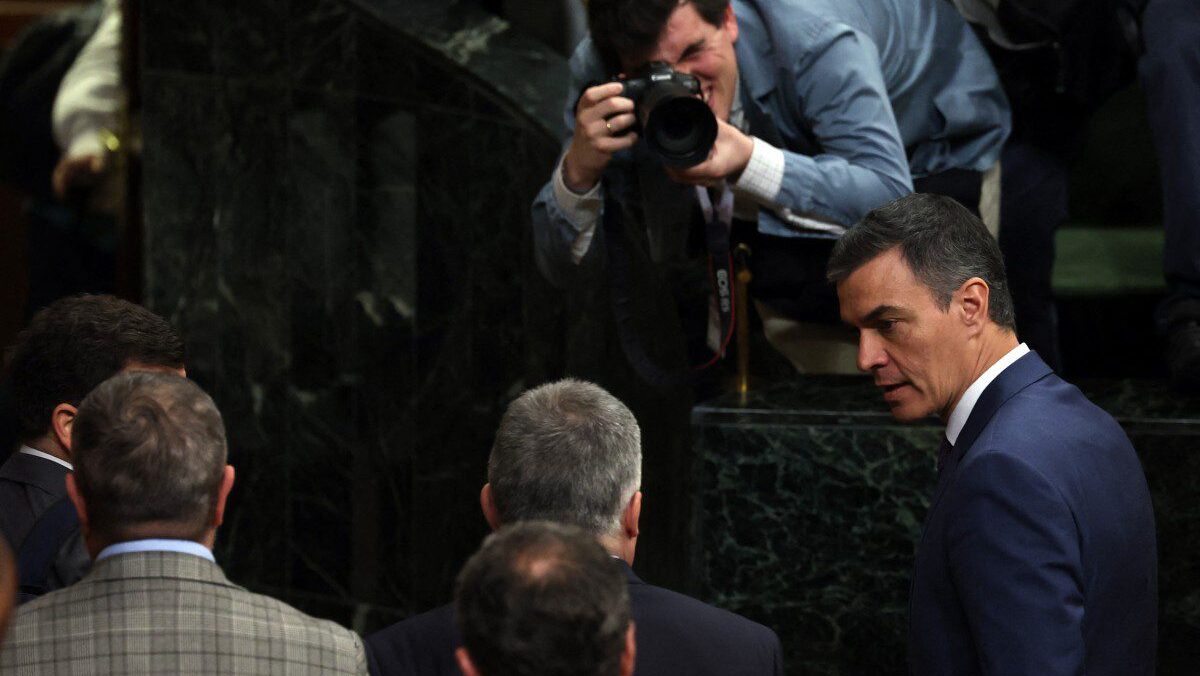
Spanish Prime Minister Pedro Sánchez (R) leaves the chamber of the Spanish parliament’s lower house, Congress of Deputies, after voting on a bill that exonerates figures sentenced or prosecuted for their role in Catalonia’s illegal 2017 independence bid, in Madrid on March 14, 2024.
Photo: Pierre-Philippe MARCOU / AFP
The amnesty law resulting from negotiations between PM Pedro Sánchez and Catalan separatists was passed by the Congress of Deputies, the lower chamber of the national parliament, on Thursday, March 14th after intense debate.
The controversial law obtained the expected 178 votes in favor and 172 against. It not only pardons the organizers of the illegal 2017 referendum on the region’s independence from Spain, but also gives a blanket amnesty for all crimes committed by Catalan separatists in connection with the referendum—from street violence and rioting to drug dealing, embezzlement, money laundering, treason, and terrorism.
Prime Minister Pedro Sánchez only appeared in the chamber immediately prior to the vote, after the debate had ended. He needs the bill to pass in order to retain the support of Catalan separatists in the parliament and hold his fragile coalition government together.
Opposition leaders did not fail to point out his absence in their speeches opposing the bill.
“Why didn’t Mr. Sánchez want to defend this marvel? Because even he sees himself incapable of standing up for this delirium?” Alberto Nuñez Feijóo, leader of the center-right Partido Popular said, before referring to Sánchez’ broken electoral promises:
First, there was not going to be an amnesty, then, there was not going to be an amnesty for terrorism, then there was going to be an amnesty for terrorism but only a little, but still not for high treason, and finally there was amnesty for terrorism, embezzlement, corruption, and high treason. They have accepted everything.
The leader of VOX, Santiago Abascal, also criticized Sánchez’ absence.
“He has no scruples, no limits, no principles, other than holding on to the blue seat [the ministerial bench],” Abascal said. “Sánchez has sold the sovereignty of the Spanish.”
Another political development has further complicated the situation. Pere Aragonès, the current regional president of Catalonia, on Wednesday called regional elections for May 12th after failing to pass a budget for the regional government. It came as an unexpected development and reflects the divisions within the Catalan separatist movement and the political instability in Spain, particularly on the Left.
Aragonès is a member of Junts per Catalunya, the same party as fugitive of Spanish justice and MEP Carles Puigdemont. The MEP was the president of Catalonia in 2017 and, from this position, masterminded the illegal 2017 referendum. The amnesty bill is aimed principally at allowing him to return to Spain without having to face a trial.
The amnesty bill still has to pass through several parliamentary steps and wouldn’t come into effect until May. Nevertheless, as the situation stands in Spain right now, Puigdemont could present himself as a candidate for the Catalan presidency, since he has yet to be formally charged with terrorism and high treason, as these are still under investigation.
If the amnesty goes through, Puigdemont would likely be able to return to Spain to take up the regional presidency, should his party win—which is a strong possibility. He has been cagey with the press about whether he will stand for election but did say that the possibility of him being in Spain following the elections gave him hope.
